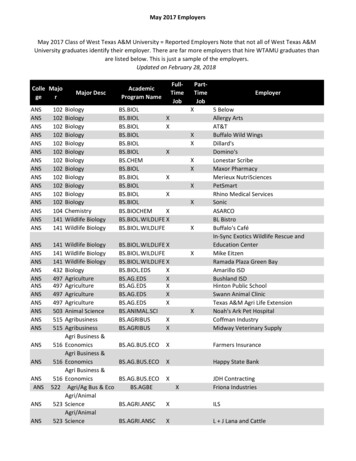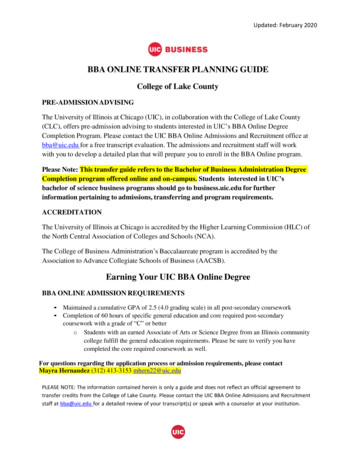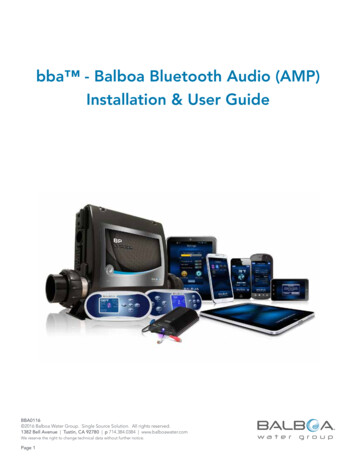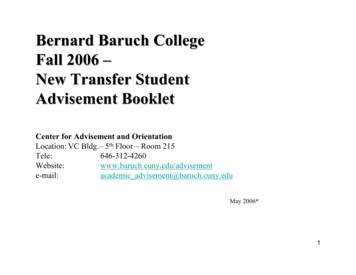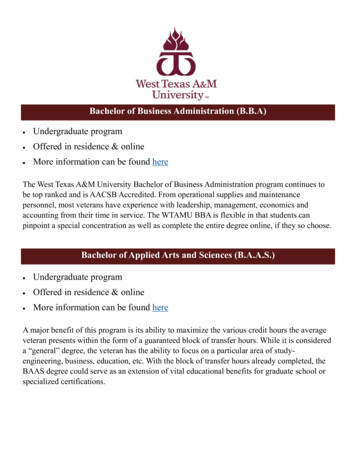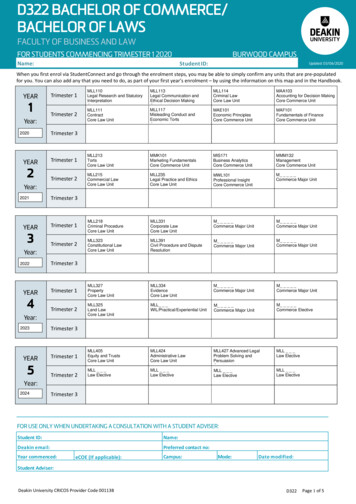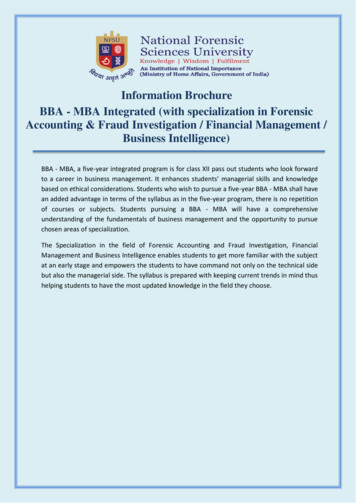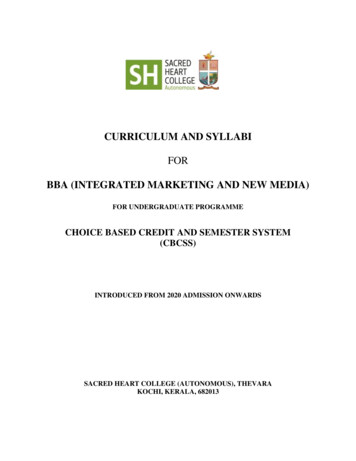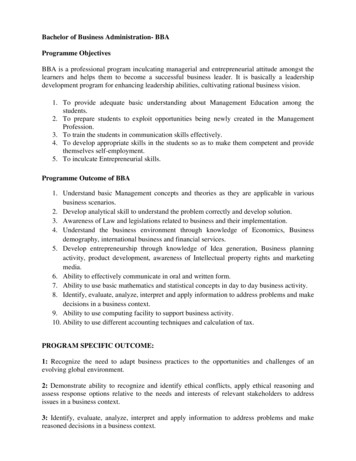
Transcription
Bachelor of Business Administration- BBAProgramme ObjectivesBBA is a professional program inculcating managerial and entrepreneurial attitude amongst thelearners and helps them to become a successful business leader. It is basically a leadershipdevelopment program for enhancing leadership abilities, cultivating rational business vision.1. To provide adequate basic understanding about Management Education among thestudents.2. To prepare students to exploit opportunities being newly created in the ManagementProfession.3. To train the students in communication skills effectively.4. To develop appropriate skills in the students so as to make them competent and providethemselves self-employment.5. To inculcate Entrepreneurial skills.Programme Outcome of BBA1. Understand basic Management concepts and theories as they are applicable in variousbusiness scenarios.2. Develop analytical skill to understand the problem correctly and develop solution.3. Awareness of Law and legislations related to business and their implementation.4. Understand the business environment through knowledge of Economics, Businessdemography, international business and financial services.5. Develop entrepreneurship through knowledge of Idea generation, Business planningactivity, product development, awareness of Intellectual property rights and marketingmedia.6. Ability to effectively communicate in oral and written form.7. Ability to use basic mathematics and statistical concepts in day to day business activity.8. Identify, evaluate, analyze, interpret and apply information to address problems and makedecisions in a business context.9. Ability to use computing facility to support business activity.10. Ability to use different accounting techniques and calculation of tax.PROGRAM SPECIFIC OUTCOME:1: Recognize the need to adapt business practices to the opportunities and challenges of anevolving global environment.2: Demonstrate ability to recognize and identify ethical conflicts, apply ethical reasoning andassess response options relative to the needs and interests of relevant stakeholders to addressissues in a business context.3: Identify, evaluate, analyze, interpret and apply information to address problems and makereasoned decisions in a business context.
4: Communicate in a business context in a clear, concise, coherent and professional manner.5: Demonstrate the understanding and ability to apply professional standards, theory, andresearch to address business problems within specific concentrations.FYBBA Semester I (CBCS) Pattern 2019Course: Principles of Management(101)CC credit:3Course Objectives:1. To understand basic concept regarding organization business administration.2. To examine how various management principles.3. To develop managerial skills among the students.CO1Course unit DescriptionNature of managementCO2Evolution of managementthoughtCO3Major managerial functionsCO4Recent trends in managementOutcomeTo learn basic aspects of management thinkingDevelop ability of managerial thinking & cultivatebusiness acumenTo understand different approaches of managementscientist to management thought & philosophyTo help to understand various approaches ofmanagement thinkingTo understand different functions of management &their roles.Develop ability to organise various programs &events.To understand the themes in modern management &changes in the businessTo learn about new systems of management.COURSE NAME: BUSINESS COMMUNICATION SKILLSCOURSE CODE: 102CCT: credit 4Course Objectives:1 To understand what is the role of communication in personal and business world2. To understand system and communication and their utility3. To develop proficiency in how to write business letters and other communications.COURSE UNIT DESCRIPTIONCO1 Concept of CommunicationOUTCOMEApply communication theories. Show anunderstanding of opportunities in the field ofcommunication.CO2 Methods and types of Communication Demonstrate critical and innovative thinking.Display competence in oral, written, and visualcommunicationCO3 Business CorrespondenceUse current technology related to thecommunication field.
CO4 Analysis of different Media ofCommunicationDemonstrate positive group communicationexchangesRespond effectively to cultural communicationdifferences.Communicate ethically.COURSE Business AccountingCOURSE CODE: 103CC credit:3Objectives:1.To develop right understanding regarding role and importance of monetary and financialtransactions in business.2.To cultivate right approach towards classifications of different transactions and theirimplications.3.TO develop proficiency preparation of basic financial as to how to write basis accountingstatement -Trading and P&LCO1Course Unit DescriptionFinancial Accounting-Accounting concepts,principles and conventions. Classification ofaccountsCO2Accounting Transactions and Final Accounts-CO3Bank Reconciliation Statements-preparation ofBank Reconciliation StatementCO4Computerized Accounting-Role of computers andFinancial application, Accounting SoftwarepackagesOutcome1. Understand role and importance ofaccounting in Business and howaccounting concept can beimplemented in business.1. Understand how to record differentfinancial transactions and theirfinancial implications.1. Understand the kind of accountingrelationship between customer andbank.1. Understand growing importance ofsoftware and to know how to usesoftware and to write books of accountsCourse: Business economics (Micro)Course code:104CC credit:3Course Objectives:1. To understand role of economics as it influences society and business2. To study how different decisions are taken in relation to price demand and supply3. To develop right understanding regarding Monopoly, perfect competition, revenue EtcCourseunit outcome
CO 1descriptionConcept ofBusinesseconomicsCO 2demand andsupply analysisCO 3revenue and costanalysispricing undervarious marketconditionsCO 4With this unit students should be able to understand importanceof economics in their life.They should also able to know the role and purpose ofeconomics in society and students should be able to think inprudent manner.After completion of this unit students are able to understandhow the concept of demand and supply works in particulareconomy.Students should be able to examine the implications of changesin demand and supply on economics and ability to select rightalternatives in a given situation.With this unit students will understand the role and function ofrevenue in different economic decision.After completion of this unit students should be able to know andunderstand concept of market and different forces affecting completion ofmarket under different economic circumstances and they also able tounderstand market forces governing economic situations.Course: Business mathematics (105)CC credit:3Objective : To develop appropriate understanding as how to use mathematic like computationinterest, profit, percentage etc. To develop appropriate model for estimation of profit. Applying ratio to interpreted andevaluate financial data collection of 5 years reports of varies companies for analysis. . To cultivate right understanding regaining numerical aptitude.UnitCourse OutcomeCO11.Numerical Methods forBusiness Managers1. Ability to develop mathematical competencefor various interests related transaction andother activities.2. Work with simple and compound interest,annuities, invoice preparation, trade discounts,taxes, and depreciation problems in varioussituations and use correct mathematicalterminology, notation, and symbolic processesin order to be prepared for future coursework inbusiness and mathematics that requires the useof and an understanding of the concepts ofbusiness mathematics.CO22.Numerical Methods forBusiness Managers1. Ability to examine concept of discounts indifferent business solutions.
CO33.Numerical Methods forBusiness Managers2. Gain experience in using various techniquesof mathematical permutation and combinationto prove simple mathematical properties of avariety of discrete structures.1. Ability to apply the various concepts inbusiness situation.2. Appreciate business mathematicsconcepts that are encountered in the realworld, understand and be able tocommunicate the underlying businessconcepts and mathematics involved tohelp another person gain insight into thesituation.Course: Business Demography (106)CCT Credit: 04Course Objectives:1. To give proper understanding regarding concept of demography in modern economic setup2. To study how population and structure changes affecting quality of life and business3. To develop clarity of concept regarding social economic process and urbanization and itsimpact on societyCO1Course unit DescriptionUnit 1: Concept of DemographyStudy of demography as an essentialdiscipline of social economic changeCO2Unit2 Distribution of population andPopulation growthCO3Unit 3 Population as ResourceOutcome Understand Growing importance ofDemography in modern economics andsociety and the components ofdemography understand Socio economic changes asa outcome of demographic changes To understand how population growthinfluences economy and society CO4Unit 4 Urbanization and its implicationsConcept of urbanization, To understand importance of humanresource in modern and socio- economicenvironment and to learn about role ofliteracy in economic developmentAbility to examine implications ofchanges in populationTo understand the various determinantsof urbanization and migrationAbility to understand how urbanizationaffects the resource allocation andresource planningFYBBA Semester II Pattern 2019
Course Name -: BUSINESS ORGANISATIONS AND SYSTEMCourse Code -: 201Credit: 4Course Objective:1) To understand role and functions of modern business2) To develop right understanding regarding business environment3) To study how a business institution functions in a given economic set up.CO1COURSE UNITDESCRIPTIONNature and evolution ofBusinessCO2Forms of BusinessOrganizationCO3Setting up of a businessenterpriseCO4Study of Domestic and ForeignTradeOUTCOMEUnderstand the purpose of business, learn how abusiness unit works and serves the society, historicalprogress of business as an economic entity, socioeconomic changes have led to economic developmentand assess the new trends in commerceUnderstand the significance of different forms ofbusiness organizations their types, function, merits andlimitationsUnderstanding of the main working aspects oforganisations, not only from an economic point ofview but also considering organisations as part ofsociety.Knowledge of a comprehensive glossary of economicterms widely used in the analysis and discussion ofbehaviour organisationlearn about how a retail trade works in businesssystem, different forms of retail trade and theircontribution in the economy and able to give a briefintroduction to stages of internationalizationCourse : Principles of marketing(202)Credit:3Course Objectives:1. To develop right understanding regarding marketing environment in the country2. To develop appropriate conceptual understanding as to develop basic marketing concept3. To develop new understanding regarding regarding services, rural marketing & new trends inmarketing.CO1Course unit DescriptionConcept & functioning ofmarketingCO2Marketing Environment &marketing segmentationCO3Constituents of marketing mixCO4Classification & types of marketsOutcomeTo Understand marketing conceptsTo understand role functions & importance ofmarketing managerTo know about changing various factors which affectthe marketing system & Indian marketing systemTo know the types of segmentationTo understand the marketing mixTo know each constituents of Marketing mix to getsuccess in the market.To understand different types of markets,their role &functions
Awareness of recent trends in marketingSubject: Principles of FinanceSubject Code: 203Credit:3Objectives1.To cultivate right approach towards money , finance , and their role inbusiness2.To develop right understanding regarding various sources of finance and their role and utilityinbusiness3.To develop basic skills as to concept of capital structure and concept of capitalstructureCO1CO2Course Unit DescriptionBasic concepts in financeFinancial ManagementApproaches of financial managementSources ofFinanceExternal and Internal SourcesCO3Capital StructureFactors affecting capital structure,CapitalizationCO4Recent Trends in businessFinanceVenture Capital, Leasing, Microfinance,Mutual FundOutcome1) To develop Competence to apply variousconcept in finance for decision making1) To developrationalunderstanding regarding role and utility ofdifferent sources of finance1) To understand importance of rationaland sound financial structure2)To understand role of capital as adeterminant businesssuccess1) To have right understanding how modernbusiness is changing and what are the newtrends in business financeCourse: Basics of Cost AccountingCourse code 204Credit: 3Objectives:1. To develop rational understanding regarding concept of cost expenditure in business2. To develop understanding how overheads influence the cost structure of cost3. To develop skills for computation of total cost for a particular productCO1Course unit DescriptionBasic concept in costAccountingCO2Elements of costand Cost SheetCO3OverheadsOutcome Understand importance of costing in decisionmaking Ability to understand importance of costingand role of costing Ability to examine different aspects of cost asthey influence total cost structure and salesprice. Ability to prepare comprehensive cost sheet. Understand concept of overhead as itcontributes to total cost of a product or service
CO4Contact and process cost andMethods of costing Ability to ascertain and distinguish differenttypes of overheads as it influences the total costin a given situationAbility to ascertain cost of a particular contractunder different circumstances.Ability to ascertain cost of a particular processand calculation of normal/abnormal loss orgain.Business StatisticsCourse code 205Credit 3Course Objectives:1. To understand role and importance of statistics in various business situations2. To develop skills related with basic statistical technique3. Develop right understanding regarding regression, correlation and data interpretationCO1Course unit DescriptionFrequencyDistributionOutcome Recognises the different methods ofClassification and Tabulation Interprets the diagrams and graphs. apply various methods to collect andrepresent data. Recognizes central tendency andvarious measures of central tendency Evaluates and interpret partitionvalues – Quartiles, Deciles andPercentiles.CO2Measure of Central TendencyCO3Measures of Dispersion Recognize and evaluate the measuresof dispersion-Range, Quartiledeviation, Meandeviation,Standard deviation.CO4Correlation and Regression Calculate and interpret thecorrelation between two variables.understand regression analysis CO5Index Numbers Interpret and use a range of indexnumbers commonly used.Fundamentals of ComputersCourse code 206Credit 4Course Objectives1 .The main focus lies on software programs the students will need during their studies, projectsand further on in their professional life, e.g. creating presentation with Power Point, text writingwith Word and analyzing data with Excel.
2. This course is a skills-oriented course which will help students to become familiar withsoftware systems and the internet.3.The purpose of business informatics as an academic discipline is the development andapplication of theories, concepts, models, methods and tools for analysing, designing, and usinginformation systems.4.It is expected, that students can handle browsers, word processors, spreadsheets, electronicmail software, etc.CO1CO2CO3CO4Course unit Description1:Introduction to computersUnit 2:Basics of Computer Networksand InternetUnit 3: Introduction to SpreadsheetSoftware and Presentation SoftwareUnit 4: Introduction to Internet andCyber SecurityOutcome Understand main characteristics of Computer,fundamental hardware components that makeup a computer’s hardware and the role of eachof these components, the basic ideas used intranslating high level languages to machinelanguage. Students will understand the differencebetween hard copy and soft copy and deviceswhich are used to input and output soft copy. .How OS evolved from simple controlprograms to batch OS, multiprogramming OS. To understand structure and modelling ofcomputer networking and data communicationin business process. . Construct formulas, including the use ofbuilt-in functions, and relative and absolutereferences,create and modify charts as wellthey can use the Excel online Help feature. Students will analyze, design, implementthrough MS-Powerpoint. To understand structure and modelling ofcomputer networking and software in businessprocess.
(Pattern – 2013)w.e.f. 2014-2015B.B.A. SEM – IIISubject: Personality Development(Course Code –301)Course Objectives:1. To make the students aware about the dimensions and importance of effectivepersonality.2. To understand personality traits and formation and vital contribution in the worldof business .3. To make the students aware about the various dynamics of personalitydevelopment.CO1COURSE UNITDESCRIPTIONIntroductionCO2Personality Traits.CO3Pillars of personalitydevelopment:CO4Self EsteemCO5Personality FormationStructureOUTCOMEA coherent and robust student development is builtDevelop and exhibit and accurate sense of selfDevelop and nurture a deep understanding of personalmotivationDevelop an understanding of and practice personal andprofessional responsibilityPractice and perform professional written and oralcommunication , Take responsibility , Think criticallyPractice creativityLearn to balance confidence with humilityAssert strengthened personal character and further, anenhanced ethical senseUnderstand and appreciate frameworks for ethicaldecision-makingStudents will apply ethical theories to leadership situationsSubject: Business Ethics (302)Objectives1. Objectives: To impart knowledge of Business Ethics to the students.2. To promote Ethical Practices in the Business.3. To develop Ethical and Value Based thought process among the futuremanagers, entrepreneurs.
CO1Course Unit DescriptionOutcomeBusiness EthicsUnderstanding the importance of Ethics in Personaland Professional Life.Learn to apply moral reasoning to specific situationsin the business.Learn to Recognize and resolve ethical issues inbusiness.CO2Area of Business Ethics :CO3Business Ethics in GlobalEconomy :CO4CO5Moral Issues in Business :Functional Ethics:Learn to deal with ethical global issues.Inculcate the values to be a part of civilized society.Identify the moral issues in the business and learn toovercome it with good business practices.Awareness about environment protection andconsumer protection.And Corporate Social Responsibilitylearn to protect innovation in the form of intellectualproperty rights.
Course: Human Resource Management & Organizational BehaviorCode: 303Course Objectives:1. To introduce to the students the functional department of human resourcemanagement and acquaint them with the planning, its different function in anorganization .CO 1Course unitdescriptionIntroduction to HRMCO 2HRPCO 3T&DCO 4PerformanceAppraisalCO 5Introduction to OBoutcomeAfter completion of this unit students should be able to getbasic knowledge of HRM practices carried out in today’sscenario.After completion of this unit students would be knowing theprocess of recruitment and selection of employees in anorganization.With this unit students know the training and developmentmethods and evaluation of employees skills in organization.After completion of this unit students should be able to knowthe various methods of appraisal parameters to evaluationperformance of the employees.Students should be able to understand the basic concept of OBand to will also acquaint about major trends in OBSubject: Management Accounting(Course Code - 304)Objectives:1.To impart basic knowledge of Management Accounting.2. To know the implications of various financial ratios in decision making.3. To study the significance of working capital in business.4. To understand the concept of budgetary control and its application in business.5. To develop the calculating ability of various techniques of management accounting.Course unit DescriptionOutcomeCO1 UNIT 1 Introduction Understand basic concepts ofMajor types of AccountingManagement Accounting Understand difference betweenfinancial Accounting, costAccounting and ManagementAccountingCO2UNIT 2 Analysis and Interpretation ofFinancial Statement CO3UNIT 3 Fund Flow Statement and CashFlow Statement Understand limitations of financialstatement and importance FinancialanalysisAbility to calculate and apply variousfinancial ratios in decision making.To understand concept of Fund FlowStatement and Cash Flow Statementas a technique of financial analysis
CO4 UNIT 4 Working Capital CO5UNIT 5 Budget and Budgetary Control Understand the significance ofworking capital in business.Ability to calculate estimatedworking capital for businessUnderstand the concept of budget,budgetary control and its applicationin businessAbility to prepare cash budgetCOURSE NAME: BUSINESS ECONOMICS (MACRO)COURSE CODE: 305Course Objectives:1. To study the behavior of working of the economy as a whole.2. To develop an analytical framework to understand the inter-linkages among thecrucial macroeconomic variables.3. To apply economic reasoning to problems of business and public policy.COURSE UNITDESCRIPTIONCO1 IntroductionCO2 National Income AccountingCO3 Theory of Income andEmploymentCO4 Business Cycle, Inflation andDeflationCO5 Macro Economic PoliciesOUTCOMEDefine macroeconomics and explain how economicindicators like GDP are used to assess the state of theeconomyDifferentiate between and calculate nominal and real GDPDescribe economic growthUnderstand that economic growth is a relatively recentphenomenon, and identify key institutional factors thatcontribute to economic growthUse the AD-AS model to explain the equilibrium levels ofreal GDP and price level.Examine factors that shift aggregate supply and aggregatedemand.Explain policy implications of Keynesian economics.Understand the tenets of Neoclassical Economics.Describe and calculate unemploymentExamine causes and types of unemployment, includingcyclical, frictional, structural, and natural unemploymentDefine inflation and explain how the rate of inflation iscalculatedIdentify the consequences of inflationExplain fiscal policies, including automatic, expansionary,and contractionary fiscal policiesCompare neoclassical and Keynesian approaches to FiscalPolicy
COURSE TITLE: IT IN MANAGEMENT.COURSE CODE: 306Course Objectives :1) This course provides an introduction to the computer System and types of Topologies andNetworking types with relational Model. We will cover basic relational database design,conceptual data modeling practices, some relational database management system , operationand fundamental Structured Query Language (SQL)2. To develop rational approach as to how computers can be used in data process analysis inbusiness.3. To understand the role of IT in Management. And understand the basics of operating systems.4. To know the current happenings in IT industry and how it is beneficial to expand business.At the end of the course following outcome is expected:Course unitDescriptionManaging HardwareandSoftware AssetsOutcomeC02Managing DataResourcesC03Networking1)To develop the understanding of how the data were Organized inTraditional File Environment.2) to develop the skill of various Database Approach to DataManagement.3) How to create new Database Environment.4) To develop the functionality and services providedby DatabaseTrends.1) To learn theprocess for usage of different Computer application inbusiness processes2)To develop understanding regarding need, structureandworking ofcomputer networking in businessoperations.3) To develop skills and ability to handle differentapplications inbusiness processC04The Internet and TheNew InformationTechnologyInfrastructure :1) To understand cautions andstapes to be taken andnet based services.2) Ability to handle various software and programmeswith duecautions and care3)What are various IT infrastructure required for the Digital Firm.4) The use of Internet and requirement for The IT infrastructure for theDigital Firm.C05Understanding theBusiness values ofSystem and ManagingChange:1) To Understand the Business Values of Information System fromBusiness point of view .2) The understand Importance of Change Management in InformationSystem Success and how to cure the Failure issues and ManagingImplementations in businessCO11) To understand role and importance of computers inbusinessprocesses2) To develop understanding regarding role ofcomputers inbusinessoperations.
(Pattern – 2013)w.e.f. 2014-2015B.B.A. SEM – IVCourse : Production & operation management(401)Course Objectives :1. To provide goods and services at the right time, at the right place at the right manufacturingcost of the right quality.2. To understand manufacturing technology and its role in developing business strategy.3. To identify the role of operation function.4.To understand recent trends used for quality managementCO1CO2CO3Course unit DescriptionIntroduction to productionmanagementProduct design & productdevelopmentProduction Planning &controllingCO4Productivity & ErgonomicsCO5Quality managementOutcomeUnderstand basics of production ,itsobjective,scopeof production activities & types of production etc.Role & responsibilities of production manager.Understand product policy & techniques of productdevelopment.Understand importance of production planning &problems in planning & controllingLearn techniques od production planning & controlUnderstand importance of productivity & varioustechniques to improve productivityUnderstand how ergonomics concept is essential inproductionUnderstand different techniques to improve quality inoverall production activities & in organisationCourse: Industrial Relations &Labour LawsCOURSE CODE:402Course Objectives:1. TO impart the students with the knowledge about complexities between labour andmanagement relationships.2. To make the students aware about mechanisms of industrial disputes and friendlyinterventions to deal with employee-employer problems.3. To impart the students with the knowledge of laws and how law affects the industry andlabour.Course unit descriptionOutcomeCO 1CO 2CO 3Introduction to Industrial RelationsThe aim of this course is to introduce studentsof industrial relations and Labour laws to thecommon law and legislative regime whichconstitutes the regulatory framework of theemployment relationship in industries.IndustrialDisputes,Collective Students can learn about their rights andBargaining and workers participation in ployee under currentIndian Legal legislationThe Industrial Disputes Act 1946 &This course will explore the legal framework
The Factories Act 1948:CO 4CO 5regarding various provisions related toemployees.The Payment of wages Act, 196 & The Students will get knowledge of legalMinimum Wages Act 1948.dimensionsofdifferentmodesofemployment, remuneration, industrial action,health and safety regulation, termination ofemployment, as well as equity anddiscrimination law.Trade union laws:This course intended to help students acquirea good historical, theoretical and practicalworking knowledge of the Indian legal systempertaining to Trade union Act.Subject: Business Taxation(Course Code - 403)Objectives:1. To understand the basic concepts and definitions under the Income Tax Act, 1961.2. To update the students with latest development in the subject of taxation.3. To Acquire knowledge about Computation of Income under different heads of Income ofIncome Tax Act, 1961.4. To acquire knowledge about the submission of Income Tax Return, Advance Tax, Taxdeducted at Source, Tax Collection Authorities.5. To prepare students Competent enough to take up to employment in Tax planner.6. To develop ability to calculate taxable income of firms, co-operative societies andcharitable trust.CO1Course Unit DescriptionIncome Tax Act -1961CO2Computation of Taxable Income underthe different heads of IncomeCO3CO4Computation of Total Taxable Incomeof an IndividualMiscellaneous conceptsCO5Assessment of various EntitiesOutcomeUnderstand Meaning, Concepts andDefinitions under Income Tax Act -1961Ability to calculate tax Income From Salary,Income from House Property, Profits andGains of Business and Profession, Incomefrom Other SourcesAbility to calculate Total Taxable Income ofan IndividualUnderstand concept of Tax deducted atsource, Return of Income,Advance payment of Tax, methods ofpayment of Tax, forms of Returns, Refund ofTax.Understand Assessment of various EntitiesSubject: International Business(Course Code - 404)Objectives:1. To acquaint the students with emerging issues in internationalbusiness.2. To study the impact of international business environment on foreign marketoperations.3. To understand the importance of foreign trade for Indianeconomy.
CO1CO2CO3Course Unit DescriptionIntroduction: Theories of InternationalTradeMultinational Enterprises:Role and importance of Multi-nationalCorporations in internationalbusiness.International FinanceExchangeRate, Determination ofExchange rate – Fixed, Flexible andManaged, International Monetary Fund,world bankCO4Regional Economic Grouping:structure and functions ofWTOEuropean Union(EU)North American Free TradeAgreement(NAFTA)Association of South East Asian Nations(ASEAN), SAARCCO5India’s Foreign Trade- Case studies inInternational Business with reference toIndian EconomyOutcome1) Inter relate the Trade Theory with theEconomic Development.2) Understand the reasons for firms
Bachelor of Business Administration- BBA Programme Objectives BBA is a professional program inculcating managerial and entrepreneurial attitude amongst the learners and helps them to become a successful business leader. It is basically a leadership development program for enhancing leadership abilities, cultivating rational business vision. 1.
